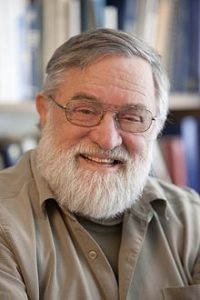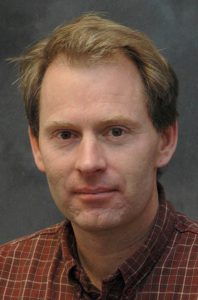The grand old man of coastal science Dr. Orrin Pilkey warns: start withdrawing from the coast-line now, or wait for the coming panic. A couple of hundred million years ago a massive warming on Earth drove most species to extinction. From the University of Toronto, Dr. Ulrich Wortmann explains the terrible similarity to our current voyage to hot world, with no one in the wheelhouse.
The struggle continues. This program opens with 15-year-old Greta Thunberg addressing António Guterres, Secretary General of the United Nations on December 4th, at the COP24 international climate talks in Poland. As we enter most difficult times humanity has ever faced, most people are coasting, hoping the crash won’t come, believing the harsh reality is not real. That leaves us lots to talk about here on Radio Ecoshock. Thank you for tuning in.
Listen to or download this Radio Ecoshock show in CD Quality (57 MB) or Lo-Fi (14 MB)
We live in exciting times. Politics became nail-biting reality TV, information wars flow through our minds. We have everything to distract us from the Judgment. I’m not talking about Robert Mueller. I’m talking about rising seas, annual firestorms, and millions of climate refugees. No belief is required to know climate change is here. Science has provided us with the startling facts. Already you can see weather is destabilized, animals are fleeing to the Poles, lives are distorted and this is just the beginning. The children can see the gathering storm clouds, but the adults refuse to look up. Can we leave this easy life? Can we give up our addictions to fossil fuels and endless consumption? Stay tuned.
Over Christmas it was Australia’s time in the climate barrel. There were record-shattering heat waves with temperatures reaching 120 degrees F, or 49 degrees C. Night temperatures also remained high. That 120 degrees in Western Australia was only 3 degrees below the hottest temperature ever recorded in Australia. The whole country was cooking. But the Australian government still plans to expand their coal exports!As we head into 2019, I notice several long-time climate bloggers and Facebook activists are “retiring” to their private lives. For example Robert Leisure, an American living in Salzburg Austria ran this on his final Facebook post for 2018:
“I’m no longer interested in awakening the masses. The masses made it clear that they are not interested.”

Robert’s Facebook page now describes him as “Former messenger of climate change now focusing on maximizing each day loving life and my loved ones“. That brought out a chorus of agreement from other climate activists, like Robin Westenra in New Zealand, and Dorsi Lynn Diaz in California. As Pink Floyd sang in “The Wall”: “It’s not easy banging your heart against some mad bugger’s wall“.
I must continue with Radio Ecoshock. As Sylvia Boorstein just wrote:
“When I recognize the pain I feel as the legitimate result of loss, I am respectful of its presence and kind to myself. My mind always relaxes when it is kind, and around the edges of the truth of whatever has ended, I see displays of what might be beginning.”
DR. ORRIN PILKEY: WALK AWAY FROM THE COAST
“We can plan now and retreat in a strategic and calculated fashion, or we can worry about it later and retreat in tactical disarray in response to devastating storms. In other words, we can walk away methodically, or we can flee in panic.” – Orrin Pilkey.
As the world warms, humans will have to move back from the ocean, cities and all. Orrin H. Pilkey wrote the book on it: “Retreat from a Rising Sea – Hard Choices in an Age of Climate Change.” In North Carolina, he is the James B. Duke Professor Emeritus of Earth Sciences. Dr. Pilkey published over 250 works, and 45 books. Duke University named a building after him. And I hope Dr. Pilkey will not mind if I call him the grand-daddy of coastal science.
From Durham North Carolina, it’s a pleasure to welcome Orrin Pilkey to Radio Ecoshock.

Dr. Orrin Pilkey
Over the past century, Americans moved massively from the interior to the coast. That is where we find fabulously priced real estate, and movies and novels of sea-side bliss. That is going away, whether we like it or not – and not just in America, but in major cities all over the world.
FROM THE COLUMBIA BOOK BLURB on “Retreat from a Rising Sea”
“Melting ice sheets and warming oceans are causing the seas to rise. By the end of this century, hundreds of millions of people living at low elevations along coasts will be forced to retreat to higher and safer ground. Because of sea-level rise, major storms will inundate areas farther inland and will lay waste to critical infrastructure, such as water-treatment and energy facilities, creating vast, irreversible pollution by decimating landfills and toxic-waste sites. This big-picture, policy-oriented book explains in gripping terms what rising oceans will do to coastal cities and the drastic actions we must take now to remove vulnerable populations.
The authors detail specific threats faced by Miami, New Orleans, New York, and Amsterdam. Aware of the overwhelming social, political, and economic challenges that would accompany effective action, they consider the burden to the taxpayer and the logistics of moving landmarks and infrastructure, including toxic-waste sites. They also show readers the alternative: thousands of environmental refugees, with no legitimate means to regain what they have lost. The authors conclude with effective approaches for addressing climate-change denialism and powerful arguments for reforming U.S. federal coastal management policies.”
That is what we discuss in this interview.
CITIES
In 2012, right after Hurricane Sandy, I spoke with Professor J. Court Stevenson from University of Maryland. We talked about surge defenses in cities around the world. Stevenson suggested that about $10 billion dollars (twice the cost of Trump’s “wall”) – the port of New York City and Manhattan could be protected against storm surges, perhaps for the next 50 years. Considering the value of the real estate there, that seems viable. Of course, that has not begun.
Do we have enough wealth left to rebuild coastal cities on the run? Not really, considering the trillions America already owes. All nations in the world have already borrowed fabulous amounts from the future.
Maps of future Florida show Miami going under the sea, like the ancient Greek port of Alexandria. Pilkey tells us there is no way to build any flood walls for Miami. The ground underneath that city is so porous that even small ponds in the city show tiny tides when the ocean comes in and out. Miami will simply go under, bit by bit, or all of a sudden in a mega storm or two. That includes Trump’s Mar-a-lago.
What happens to mega-projects like Boston’s “Big Dig”, the new tunnel in downtown Seattle, or airports like Japan’s Kansai International Airport? We invested trillions of social wealth in these projects. They are doomed. Sea level was more or less a standard for about 10,000 years. All the maps show “elevation above sea level”. That all changes now.
Listen to or download this 27 minute Radio Ecoshock interview with Orrin Pilkey in CD Quality or Lo-Fi.
====================================================================================================================
PAST AND FUTURE WORLD: DR. ULRICH WORTMANN
A new study investigates the possible end-game example of extreme global warming hitting the ocean. Around 55 million years ago, during the Paleocene–Eocene Thermal Maximum or (PETM) the ocean lost oxygen to harbor dead zones. Large layers of the ocean became uninhabitable for multicellular organisms. That dying ocean condition started with a 5 degree C warming – about what the IPCC predicts for the year 2100 at our current rate of greenhouse gas emissions. For me, warming in the global ocean is another sign we should break open the glass and pull the climate alarm.
The study was published in the journal Science on August 24, 2018. We’ve reached co-author Dr. Ulrich G. Wortmann, Associate Chair of the University of Toronto Department of Earth Sciences. The paper is “Large-scale ocean deoxygenation during the Paleocene-Eocene Thermal Maximum“.

Dr. Ulrich Wortmann, University of Toronto
The Wikipedia article on ocean deoxygenation lists two ways ocean warming causes loss of oxygen. Then, without any citation, WIKI says “Ocean model simulations predict a decline of up to 7% in the global ocean oxygen content over the next hundred years.” Ulrich agrees that is possible.
A 7% loss of ocean oxygen sounds dramatic. Our listeners can imagine what would happen if the atmosphere lost that much oxygen. Medically, we could still breath, but we would be too sluggish for strenuous work and our mental judgment would be impaired. What happens to ocean life when oxygen is reduced? We humans understand oxygen. We want to hear all about that. But a big part of this story and Wortmann’s past work is about something else: sulfur.
We have an institutionalized aversion to learning about sulfur. Sulfur is a sign of the Devil, and the rotten egg smell that we instinctively run away from. Sulfur plays into ocean deoxygenation. It almost makes me wonder if this new science is catching up to the work done by Dr. Peter Ward from the University of Washington. In his 2007 book “Under a Green Sky“, Ward suggested that sulfur dioxide coming from an overheated ocean caused mass extinction on land. You can hear my 2008 interview with Dr. Ward here, and my blog about it here.
Dr. Wortmann and I also discuss his earlier paper in 2016, with K.W. Bauer, about another Oceanic Anoxic Event. That was 124 million years ago. Another of Wortmann’s earlier papers seems relevant: “Rapid Variability of Seawater Chemistry Over the Past 130 Million Years.” He found ocean chemistry remains pretty stable for long periods, but then can change relatively rapidly. That seems important to know now, as our emissions heat the ocean.
The introduction to the new paper, with lead author Weiqi Yao says:
“Here we present sulfur-isotope data that record a positive 1 per mil excursion during the PETM. Modeling suggests that large parts of the ocean must have become sulfidic. The toxicity of hydrogen sulfide will render two of the largest and least explored ecosystems on Earth, the mesopelagic and bathypelagic zones, uninhabitable by multicellular organisms. This will affect many marine species whose ecozones stretch into the deep ocean.”
Let me repeat: THE TOXICITY OF HYDROGEN SULFIDE WILL RENDER TWO OF THE LARGEST AND LEAST EXPLORED ECOSYSTEMS ON EARTH, THE MESOPELAGIC AND BATHYPELAGIC ZONES, UNINHABITABLE BY MULTICELLULAR ORGANISMS.
From the Yao/Wortmann paper conclusion:
“Modeling predictions exploring the effects of anthropogenic climate change suggest that measurable oxygen loss from the subarctic North Pacific will occur by 2030 to 2040 and that the total volume of suboxic ocean water will expand by 50% by 2100.
Once local oxygen concentrations drop below 4 mm, sulfate reduction will commence, resulting in the production of H2S, which is toxic at levels as low as 4 mg/liter.
This will (A) create an ocean internal reservoir of reduced sulfur;
(B) create an ocean that is no longer well mixed with respect to sulfate; and
(C) compress the ecozones of fish species that venture in the mesopelagic and bathypelagic zones (27) and change their ecosystem structure, which could jeopardize 10 to 50% of worldwide pelagic predator diversity with unknown consequences for global fish stocks.
Our findings suggest that (A) and (B) have been well expressed during the PETM, and given the similarities between the PETM and the IPCC RCP8.5 emission scenario, (C) will be a possibility in the not-too-distant future.”
Let’s go to one final quote from this new paper’s conclusion: “given the similarities between the PETM and the IPCC RCP8.5 emission scenario, [compression of where fish can live and threats to their ecosystem] will be a possibility in the not-too-distant future.” Apparently a great mass extinction event like the Paleocene–Eocene Thermal Maximum around 55 million years ago is similar to the “business-as-usual” scenario published by the Intergovernmental Panel on Climate Change.
Wikipedia says: “The decline of oxygen is projected to continue for a thousand years or more”. This we leave to our descendants, an ever-less oxygen rich ocean, and ever-declining fish and other species in the sea.
THANK YOU TO HOLIDAY SUPPORTERS!
A number of Radio Ecoshock listeners sent in donations over the holidays. Every bit is much appreciated. If you too would like to help, the easy details are here.
I’ve got a number of exciting guests lined up for the start of this New Year – exciting in a doomy sort of way. But I’m hoping a thread of motivation and activism will appear and crest in this new year. Already we have Washington State Governor Jay Inslee announcing he will run for U.S. President in 2020 – with global climate change as his main message. Other young Democrats elected to the House of Representatives are also pushing for climate crisis action. A little light is shining through in the United States, even as it fades in other countries. We shall see.
Alex
Dear Alex,
Thank you for not stopping, for not retiring to a quiet life. You would be dearly missed here in California. Much love for all your work.
Thanks for all your precious work and scientific reviews.
You are also read in France
Pingback: Climate and nuclear news, week to 15 January | Nuclear Australia